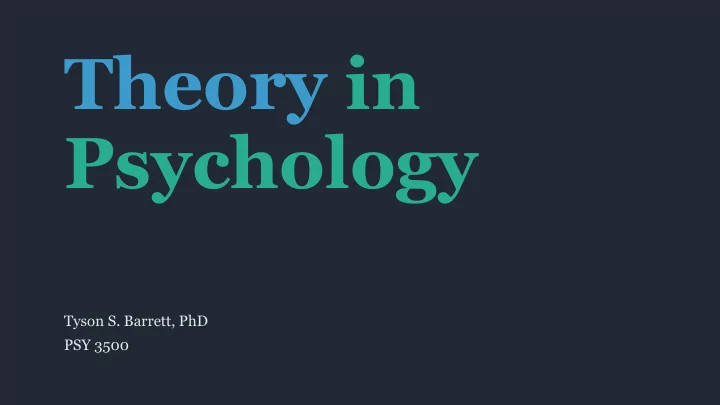

Theory in Psychology Tyson S. Barrett, PhD PSY 3500
Phenomena “ A phenomenon (plural, phenomena) is a general result that has been observed reliably in systematic empirical research ,” (pg. 166). Bystander Effect Motivation to Work McGurk Effect End of History Illusion Serial Position Effect
Replicability For findings to be considered phenomena, we must see it consistently across many studies A single study is not definitive proof of a phenomenon • Sometimes two studies looking at the same thing can have different results How? Validity issues with one or Random chance both studies Phenomenon depends on some other factor
Theories A theory is a coherent explanation or interpretation of one or more phenomena. Generation of Organization Prediction New Research Connects phenomena Helps predict what Guides questions and in ways to help them will happen given topics for new make more sense certain circumstances research Can help us design interventions
Theories A theory is a coherent explanation or interpretation of one or more phenomena. Generation of Organization Prediction New Research In most areas, there are multiple Connects phenomena theories explaining the same Helps predict what Guides questions and in ways to help them will happen given topics for new phenomena make more sense certain circumstances research Can help us design Can a theory be useful if it is interventions inaccurate?
The Variety of Theories The extent to which the components of the Formality theory and the relationships among them are specified clearly and in detail. Scope The number and diversity of the phenomena they explain or interpret The kinds of theoretical ideas they are Approach constructed from (functional, mechanistic, stage, typologies)
Formality The extent to which the components of the theory and the relationships among them are specified clearly and in detail. Many theories start as informal and can develop into more formal theories Example of Highly Formal Theory Prospect Theory https://www.youtube.com/watch?v=sM91d5I36Po
Scope The number and diversity of the phenomena they explain or interpret Many early psych theories were super broad (e.g., Freud) Narrow Broad Organize more phenomena but tend Organize fewer phenomena but tend to be to be less formal and less precise in more formal and more precise in their their predictions predictions.
Approach The kinds of theoretical ideas they are constructed from (functional, mechanistic, stage, typologies) Functional Mechanistic explain psychological phenomena in focus on specific variables, structures, terms of their function or purpose and processes, and how they interact to produce the phenomena Stage Typologies Categorize behavior or people into specify a series of stages that people distinct types pass through as they develop or adapt to their environment
Approach The kinds of theoretical ideas they are constructed from (functional, mechanistic, stage, typologies) Functional Mechanistic Do you think there will ever be a single explain psychological phenomena in focus on specific variables, structures, theory that explains all psychological terms of their function or purpose and processes, and how they interact to disorders? produce the phenomena Stage Typologies Categorize behavior or people into specify a series of stages that people distinct types pass through as they develop or adapt to their environment
Using Theories Basic steps 1 Start with a set of phenomena and either construct a theory to explain or interpret them or choose an existing theory to work with 2 Make a prediction about some new phenomenon that should be observed if the theory is correct ( hypothesis ) 3 Conduct an empirical study to test the hypothesis 4 Re-evaluate the theory (do the findings match the theory?)
The Research Cycle
Recommend
More recommend